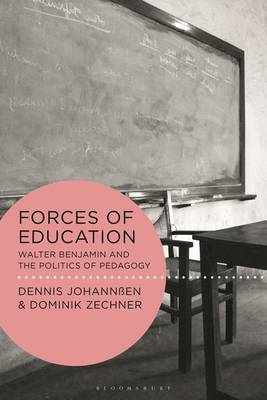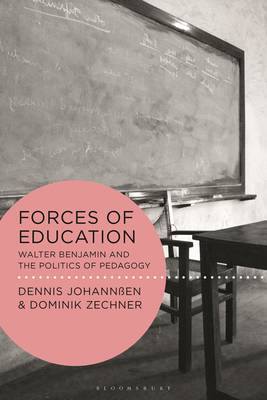
En raison d'une grêve chez bpost, votre commande pourrait être retardée. Vous avez besoin d’un livre rapidement ? Nos magasins vous accueillent à bras ouverts !
- Retrait gratuit dans votre magasin Club
- 7.000.000 titres dans notre catalogue
- Payer en toute sécurité
- Toujours un magasin près de chez vous
En raison de la grêve chez bpost, votre commande pourrait être retardée. Vous avez besoin d’un livre rapidement ? Nos magasins vous accueillent à bras ouverts !
- Retrait gratuit dans votre magasin Club
- 7.000.0000 titres dans notre catalogue
- Payer en toute sécurité
- Toujours un magasin près de chez vous
Forces of Education
Walter Benjamin and the Politics of Pedagogy
195,45 €
+ 390 points
Description
Bringing Walter Benjamin into dialogue with the urgent issues facing educational institutions today, this is the first comprehensive exploration of his philosophy of education and pedagogy.
In recent years, problems concerning the practice of education have become central to the critical discourse in the humanities: from debates regarding "deplatforming" and the redefinition of free speech on campus to the digitization of learning and the ethics of mentorship. But where do we go from here? This volume argues that Walter Benjamin's writing offers critical tools to rethink the purposes of education and the institutional forms it should assume. Reaching from his earliest writings during his involvement with the antebellum German Youth Movement to his late essays on history, theatre, and new media, the authors here explore how Benjamin argued against education as an institutional task subject to a scientific discipline. They show instead how he took his cue from language as a medium of subtle understanding to critically analyze the forms of violence inherent in the concept and history of education. For Benjamin, education was the lever to political reform. For him, the experience of youth should always be at the centre of considerations. Written by leading international scholars, Walter Benjamin and Education both contextualizes Benjamin's pedagogy in the trajectory of his own thought and also offers an astute analysis of the value and relevance of his student-focused ideas to the institutional and political challenges of today.Spécifications
Parties prenantes
- Editeur:
Contenu
- Nombre de pages :
- 248
- Langue:
- Anglais
- Collection :
Caractéristiques
- EAN:
- 9781350274167
- Date de parution :
- 01-12-22
- Format:
- Livre relié
- Format numérique:
- Genaaid
- Dimensions :
- 156 mm x 234 mm
- Poids :
- 526 g

Les avis
Nous publions uniquement les avis qui respectent les conditions requises. Consultez nos conditions pour les avis.





